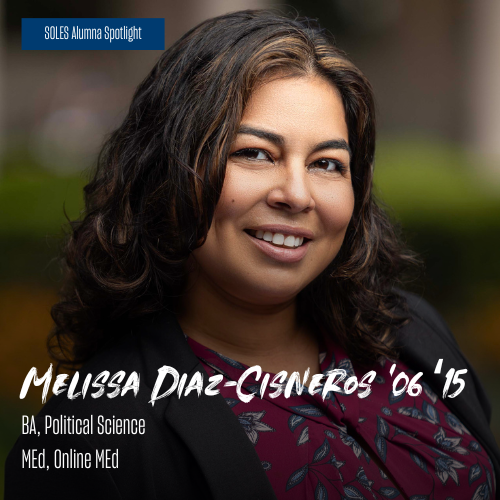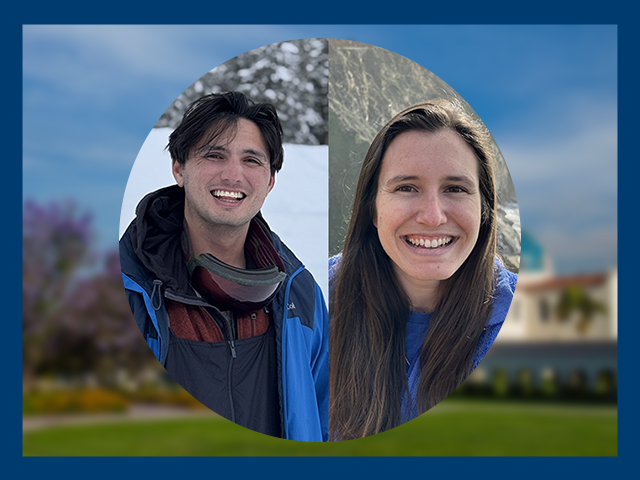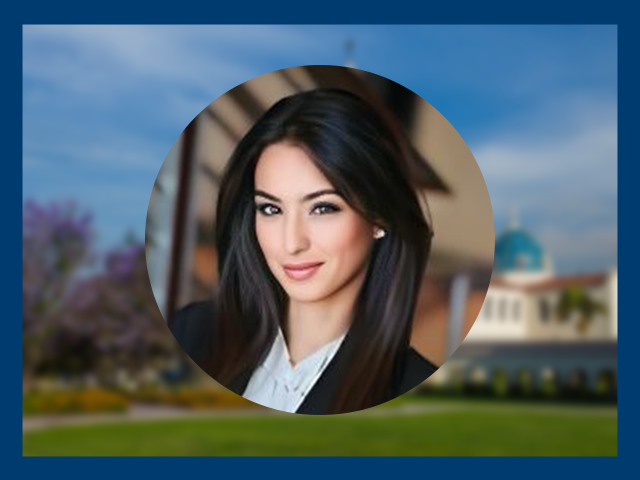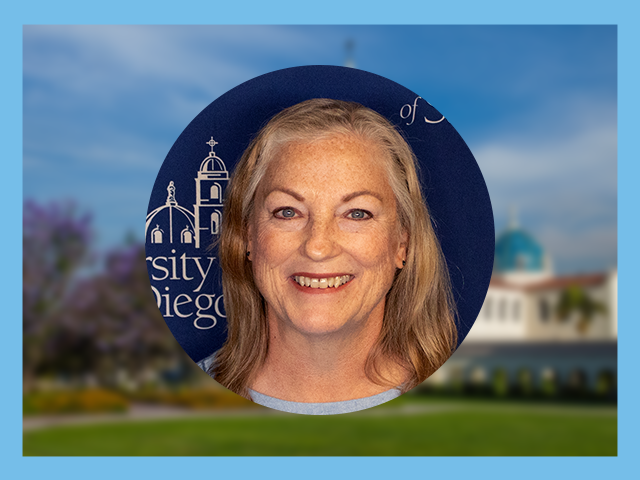SOLES Alumna Spotlight: Melissa-Diaz Cisneros ‘06 (BA); ‘15 (MEd), Online MEd

Tell us about your degree program and why you chose SOLES to pursue that degree.
I have done all of my education at USD: my undergrad, my credential program, and my MEd. When I started teaching, I wanted to further my experience with STEAM education, so I met with a few of my past professors. Nancy Hanssen was a big advocate for USD’s Online Master’s Program. I ended up following her advice, and I just loved the program. It really helped me, not only in my field of STEAM, but also in other areas of education. I got to meet some amazing educators like Dr. Suzanne Stolz, who's been a huge advocate for my work in equity and special education. It's opened so many incredible doors. I loved that I could balance my career, new family, and MEd with the help of my peers and professors.Were you planning on becoming a teacher when you first came to USD as an undergrad?
No…I majored in political science and wanted to get into the legal field. I've always wanted to help others, especially in the field of special education. After graduation, I worked at a law firm, but something was always calling me to work with children. I did a total 180 after volunteering at Kit Carson Elementary. I was always too scared of my own teachers, so I decided I wanted to change that cycle of fear and shame, especially as a minority with a learning disability.
What was your favorite class at SOLES?
Oh, wow. They were all great because they were flexible and the materials that were given to us were great. I think it was our research class, because I love to conduct research. Being able to learn how to put my work together in a more structured way was helpful. I appreciate that the class was broken down into smaller chunks, and that each class I took supported my final research project.
The feedback from professors was so helpful and it was done in such a positive manner. It never felt like they were talking down to me; it felt like they genuinely cared and wanted the best for me
Have you used the results or findings from your Action Research in your work? Have you found it helpful?
I have used the research. My research was on the barriers students face in low income communities, especially with access to STEAM. My research has fuelled my advocacy for changes in our education system. I am always finding ways to address these huge gaps in our education system.
It has allowed me to bridge out of the classroom and into the community to introduce students to fields of STEAM they never knew existed. I love to see kiddos shine when they discover their connection to these fields. I work at the school I conducted my research at. We are a Title I school and as a school community, we really push for equity. Recently, I worked with my administration to help develop a maker space at my school. We literally built it from scratch. My mission is that by the time my kiddos reach 6th grade, they will be able to code and have foundational engineering skills. My goal is to also make this a place to introduce after school programs like robotics. This coming year is the first year teachers and students will come in and access the lab for science lessons. My goal this year is to support teachers with lessons that are cross curricular and relevant to students. Anytime students can relate to the issues at hand, the more engagement there is.
Who was your favorite professor from your time in the program?
Oh, my goodness, I loved all my professors! They were all so great. You know, I had Dr. Bobbi Hansen. Dr. Hansen was so amazing – Dr. Hansen and Nancy Hanssen were both great. Dr. Stolz was amazing, too. Gosh, they were all so helpful, even though it was online. I was hesitant to do an online program, but at that time I had just had my son so I needed a program that was flexible. I was hesitant because I had heard of other programs where you never hear from your professors, But the professors in the Online MEd program were very engaging. They were always available and they set us up in these great pods where we had communication with other people in our program. I still keep in touch with a lot of those people. One of my good friends that was in the program is actually up in Sacramento and she and I are always talking about what we do in our different school districts. It's nice that it's just like a USD community - that small-knit community that's developed. They managed to somehow do it online, as well.
In what ways were you able to connect with your classmates?
We had audio. I don't remember having Zoom back then – that was way before COVID. But we did find ways to contact each other, whether it was through FaceTime or just calling each other. That was kind of the nice thing about being with the same people throughout the whole program – you knew each other and you had that ability to say, "Hey, can we meet on Thursday or Friday and talk about what you wrote in that post? Or can we just talk about the project? I didn't understand what the project was". So we didn't have Zoom, but we had the ability to communicate.
Since you live in San Diego, did you ever take advantage of being able to come to campus for support?
I did. I live incredibly close to USD, so I was always there. Even though it was an online program, my professors always had their open door policy and I could come in and meet with them, especially towards the end of our research. I came in a lot and was able to ask questions like, "Is this good? What do you think of this? Is this good to support this?" It was nice that my professors were available because, again, a lot of online programs don't offer that ability to come in and see your professors. I also loved that I had access to the library on campus. As a new mom, sometimes I needed that quiet place to work on research.
Where was your favorite place on campus?
I love USD so much, anywhere you go is super peaceful, like the Joan B. Kroc Institute for Peace & Justice (KIPJ). I love going to SOLES after hours. Watching the sunset on the West Plaza is pretty cool. I think one of my favorite places to sit and reflect is over by that little pond area at the KIPJ. Sometimes during the summer, I go on campus and get food because there’s a really good cafe. Anywhere you go on campus has a pretty cool view.
What is your favorite memory from the Online MEd program?
I have so many cool memories. I think one of my favorites was at graduation. My cohort had a little ceremony beforehand because we were the first group to go through the online program. I was three months pregnant with my second son and super pregnant; I felt horrible. But it was amazing and mind blowing to be recognized as one of the lead students in our program. That felt like a huge accomplishment because I was a mom, I was working, and I have always been a struggling student. To be recognized for my work was really awesome. To then share that with my three-year-old – that was the coolest moment ever.
Can you share a little bit about what you've been doing since graduating?
It's been a cool journey. This is my eighth year here in my school district, and I am now what's called an Impact Teacher. Our school has a high population of second language students and unfortunately, we have the lowest reading rate in the district because of that. I work with about 56 third through sixth-grade students on their reading and writing development. I meet with them every day; we work on phonics, sight words, and developing their reading level. In addition to working with my students, I am collecting data on their development. At the end of year, it's breathtaking to look at the data and see how far all my students have come. Over 98% of my students jumped two to three reading levels. I can also hear them as stronger, more confident readers. Oh, and their comprehension – wow!
On top of that, I work with our administrators to help with our STEAM lab. I also work in our district to help with our NGSS curriculum. When I'm not here at school, I'm still working. At UCSD, I work with the San Diego Area Writing Project. I do a few of the youth camps there for writing. Right now we're working on climate change and equity. Additionally, I'm working on my admin credential. I'm also advocating for special education and low-income communities. I've got a lot on my plate, but it's amazing. I wouldn't have it any other way.
This school is like my second home. The kids here are very important to me. Recently, we became what's called a Community School. Now our kids have access to paid afterschool programs from sports to arts, health care, dental, vision, and mental health, which is so important. Anything that I can do to improve the school is my mission.
How would you say that your education from SOLES has impacted your career?
My perspective of education was very different before I came to SOLES. I think, like a lot of people before becoming a teacher, you just think it's fun and you're gonna work with kids. And then I started the program and I started teaching. I love how our credential program is set up, because you get a lot more access to the classroom and you get that real-world teaching, versus some of the student teachers that I've worked with that say, "Oh, my gosh, I was in the program at another school and we didn't have access to the classroom until we actually became teachers". It was mind-boggling. SOLES prepared me and I think that the professors that are at USD in SOLES are truly passionate about education and the various things that pop up – not just how to teach reading and writing, but they're teaching us about special education, equity, and about what to do when you have children that are homeless. That prepared me and it pushed my passion even more. It's also made me think about what I want to do in the future. Eventually, I do want to get my doctorate. And someday I would love to teach at USD, as well.
How do you remain involved with USD as an alumna?
I participated in the Johnson Fellows for Education Program a few years ago, and I still work with Dr. Stolz. I'm always in contact with Dr. Stolz doing small projects. Unfortunately, I haven't done much post-COVID with our alumni community. I did some work during COVID with Dr. Perla Myers. I taught with Project VisMO, which was super fun. I also participated as a featured alum at a networking event with SOLES students earlier this semester. Outside of that, I haven't done too much. I'm always attending as many events as I can as an alumna. I do want to be more involved – especially with SOLES – because it's an amazing program. It's done so much for me in my field.
Can you share a bit more about the Johnson Fellows Program?
I participated in the two-year program. During the summers, we met as teachers and we talked about different issues in special education. After those two years ended, I was still involved in the program. You come back and you present to the new group of people, teachers, parents, and whoever is in the program. Unfortunately, I only did it for about a week last year because my son got sick. This year I presented in person on experience, bias, and myths of dyslexia and provided insight into California laws that will ensure all school districts provide yearly dyslexia screening. As a person with dyslexia, I like to share my personal experiences and how it is vital to support all students who struggle.
What advice would you give to a current student in the Online MEd program?
My advice would be to take advantage of the cohort and the people that are in the program with you. They're a great resource. Also, reach out to your professors! I feel like going from undergrad to grad school is such a different world. Professors in the grad program are a lot more open to your questions. At the beginning of the program, I wasn't doing it as much. But as people in my cohort were telling me they had reached out to the professors, I decided I should do it, too. Take advantage of the fact that you can send out a message or ask questions for clarification. I know, especially towards the end of your action research, that there are so many components. I was lucky in the fact that I live in San Diego so I could go in and ask questions in person. Definitely take advantage of your cohort and reach out to your professors.
Any final thoughts?
One thing I’d give kudos to USD for is that I noticed when I was an undergrad, I didn't see a lot of diversity in my programs. I completed my undergraduate degree in 2006, and during that time I encountered people who questioned my place at USD. Over the years, I applaud that USD has made some changes and provides more diversity on campus. I love walking into SOLES and seeing people that look like me.
Contact:
Amanda Gonzales
amanda@sandiego.edu
(619) 260-4539



